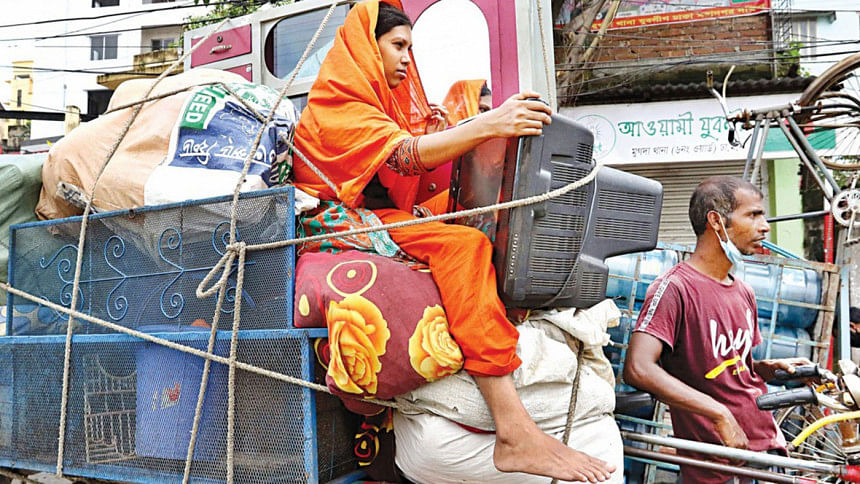Covid-19 recovery: Contexts and priorities in Bangladesh

Around a year and a half have passed since the onset of the Covid crisis. The Bangladesh economy and the global economy have certainly not been able to go back to the pre-Covid state. Though there have been some signs of recovery for the Bangladesh economy, the recovery process has remained weak, fragile and uncertain. The effective recovery process also requires a better understanding of the Covid context and setting the priorities right.
The crisis we have seen with Covid for over a year is not just an economic crisis. There is also a big social crisis. Bangladesh has made great strides in the last few decades, especially in reducing poverty. But during Covid, there has been a high jump in the poverty rate. Surveys conducted by SANEM, and some other research organisations, have found that economic fallback, induced by the Covid disruptions, have increased the number of poor people quite considerably. Many have lost their jobs. Many, having lost their jobs, have returned to their villages from the cities, which led to some socio-economic impacts and put the rural labour market under additional pressure. A large part of our economy is informal, and more than 85 percent of the people in the labour market are working in the informal sector. The informal sector has been most affected during the Covid period. Many, who had various small businesses, either have closed their businesses or are running their businesses at partial scales.
Many migrant workers have returned to the country, and the prospects of their returning to the destination countries appear to be bleak. New employment opportunities abroad are not encouraging as the destination countries are also struggling for their economic recoveries. At the same time, the domestic labour market sees the addition of a new labour force every year. One critical concern is that the pattern of economic growth in the last decade has not been at par with the objective of large-scale job creation. The problem has become more acute during Covid. There is also the big problem of a high degree of unemployment among the educated youth.
The Covid situation is getting worse again. With the imposition of stricter lockdowns, people's livelihoods are facing new challenges. The recovery we have seen in the economy in recent months is likely to be hampered by the new Covid outbreaks throughout the country and globally.
The uncertainty and instability in the global market will continue to affect the export sector and remittances. Until now, the remittances inflow, through the formal channels, remained encouraging. However, there are concerns that the total amount of the remittance inflows, if we consider both the formal and informal channels, may not have risen significantly. Also, in the case of the export sector, the recovery process has remained volatile and inconsistent. Nevertheless, just as the recovery of the export sector is crucial for the recovery of the overall economy, the recovery of the domestic economic sectors and their micro, small and medium enterprises is critical too.
The Bangladesh government announced several stimulus packages soon after the onset of the Covid crisis. It is necessary to understand whether these stimulus packages have attained their intended objectives. Some evidence shows that the distribution, management and monitoring of the stimulus packages remained inadequate and weak. SANEM has been conducting quarterly surveys of 500 firms from 15 manufacturing and services sectors since June 2020. It appears from the four rounds of surveys, with the latest one in April 2021, that there is a high degree of heterogeneity among firms and sectors in terms of access to the stimulus packages. Many firms and sectors have been facing several challenges in getting stimulus packages as the processes involved remained long and entailed many bureaucratic complications. There is a common understanding that readymade garments and large firms have benefited the most from stimulus packages. However, micro, small and medium entrepreneurs have not been able to take advantage. Lack of initiatives, transparency, accountability and efficiency can undermine the whole objectives behind the stimulus packages.
Micro, small and medium enterprises play critical roles in the supply chains of different sectors of the economy, and these have been severely affected by the Covid epidemic. Therefore, the resonant recovery of these enterprises is crucial for ensuring the strong upswing of the overall economy.
A few areas need priority to deal with the situation.
First, the availability of effective vaccines and the vaccination of mass people is critical for sustained recovery. At the same time, the enforcement of the rules and regulations related to hygienic practices is vital.
Second, the government's stimulus packages to revive the economy should be implemented more effectively and expanded if necessary. An assessment is needed to understand the challenges and constraints in implementing the stimulus packages to re-design and re-target these packages.
Third, the scopes and allocations of the government's social protection programmes for the old and new poor need to be expanded. The government must address the institutional challenges related to the design, allocation and disbursement of social protection programmes.
Fourth, it is necessary to take policies and strategies targeting the labour market. The government should introduce relevant social protection programmes in line with the ongoing labour market challenges, especially in urban areas.
Fifth, the economy requires some critical reforms in the policies and programmes. The country cannot achieve many developmental goals with a low ratio of tax-to-GDP. The financial sector also needs reforms, especially in the banking sector.
Finally, the current situation demands a departure from the conventional notions. The new reality requires an effective action plan for economic and social recoveries.
Dr Selim Raihan is a professor of economics at Dhaka University, and executive director of South Asian Network on Economic Modeling.
Email: [email protected].

 For all latest news, follow The Daily Star's Google News channel.
For all latest news, follow The Daily Star's Google News channel. 



Comments